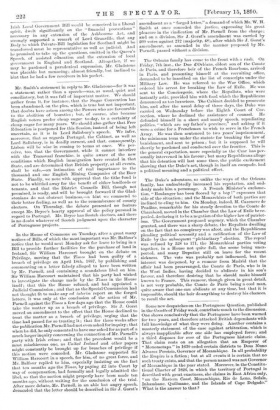In the House of Commons on Tuesday, after a great
many notices of Bills, of which the most important was Mr. Balfour's notice that he would next Monday ask for leave to bring in a Bill to provide further facilities for the purchase of land in Ireland, Sir William Harcourt brought on the debate on Privilege, moving that the Times had been guilty of a breach of privilege on April 18th, 1887, by publishing and commenting on a letter falsely alleged to have been written by Mr. Parnell, and containing a scandalous libel on him. Sir William Harcourt maintained that his party had wished to investigate the charge made by the Times in the House itself ; that this the House refused, and had appointed a Judicial Commission; and that as the Special Commission had not thought fit to make any ad interim report on the forged letters, it was only at the conclusion of the action of Mr. Parnell against the Times a few days ago that the House could take the matter up as a breach of privilege. Sir J. Gorst moved an amendment to the effect that the House declined to treat the matter as a breach of privilege, urging that the time had passed for so treating it ; that for three weeks after the publication Mr. Parnell had not even asked for inquiry; that when he did, he only consented to have one asked for as part of a much larger inquiry concerning the connection of Mr. Parnell's party with Irish crime ; and that the precedent would be a most mischievous one, as United Ireland and other papers might constantly be brought up for breaches of privilege if this motion were conceded. Mr. Gladstone supported Sir William Harcourt in a speech, for him, of no great force, and Mr. Balfour replied to him, especially insisting on the fact that ten months ago the Times, by paying 22 into Court by way of compensation, had formally and legally admitted the libel, so that the motion might properly have been made ten months ago, without waiting for the conclusion of the trial. After more debate, Mr. Parnell, in an able but angry speech, .deinaaded that the letter should be described in Sir. J. Gorst's amendment as a forged letter," a demand of which Mr. W. H. Smith at once conceded the justice, expressing his great pleasure in the vindication of Mr. Parnell from the charge ; and on a division, Sir J. Gorst's amendment was carried by 260 votes against 212 (majority, 48), after which Sir J. Gorst's amendment, as amended in the manner proposed by Mr. Parnell, passed without a division.


































 Previous page
Previous page